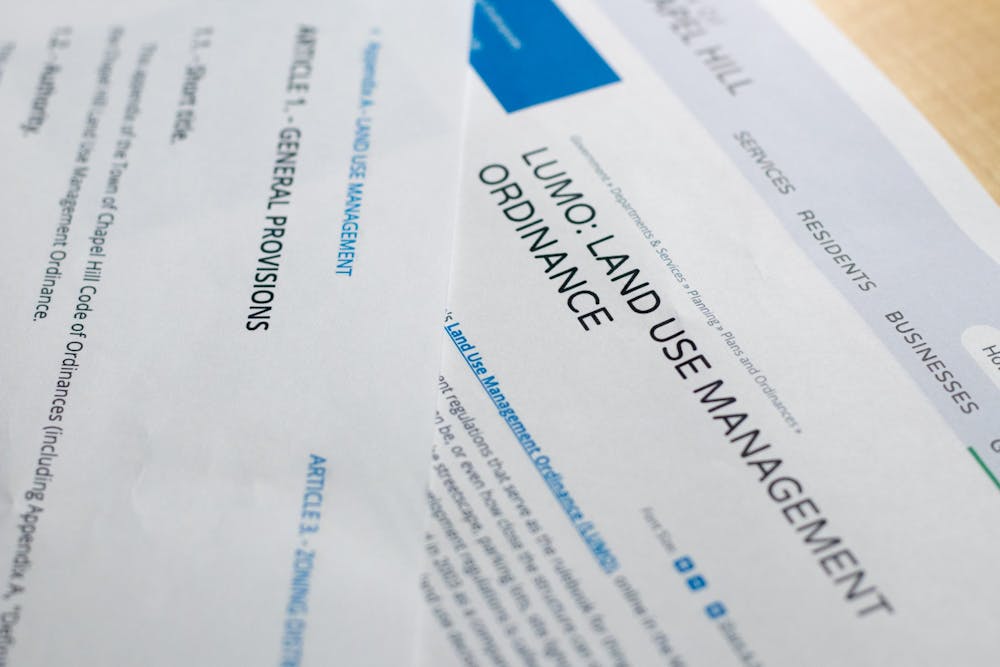Earlier this year, Carrboro Mayor Pro Tem Susan Romaine tweeted that she would like to see Carrboro's ordinance changed to allow for more "missing middle" housing to be built for middle-income residents.
Currently, many of Carrboro's neighborhoods are zoned only for single-family, detached homes, which Romaine said is the most expensive type of housing and can often create homogenous communities.
She said a change in the ordinance to allow for more duplexes, triplexes and townhomes in the single-family home neighborhoods would bring in people of all income levels that may currently be unable to afford to live in Carrboro.
In summer 2022, Raleigh implemented similar changes to its zoning laws, allowing duplexes and triplexes to be built in residential neighborhoods to provide missing middle housing.
The Chapel Hill Town Council also took on an amendment to its land use ordinance in November when it approved an expedited process for reviewing affordable housing projects and allowed for higher density.
But, according to Roberto Quercia, another professor in UNC's planning department, Chapel Hill is a notoriously difficult place to develop affordable housing.
"Compared with other places, developers complain that, although they met all the requirements, what they call in quotes 'red tape,' is kind of excessive at times," Quercia said.
Although there have been no affordable housing projects proposed under the new rules, Chapel Hill Affordable Housing Assistant Director Nate Broman-Fulks said he is optimistic the rule change will lead to more projects.
Whittemore said that, while zoning does play a role in the development of more affordable housing by capping the supply within a jurisdiction, other factors like the number of subsidies available also impact how much affordable housing can be built.
In places like Sydney, Australia, and Vancouver, Canada, Whittemore said single-family detached home zoning has been essentially eliminated in favor of denser types of housing. Though this has created more variation in price, Melbourne and Vancouver are still not affordable places for most people to live because of other factors, he said.
Romaine said one of her main goals in changing the ordinance is to increase home ownership among people of color, who have been systematically denied the wealth that owning a home brings through policies like redlining.
According to the Federal Reserve, redlining is a term for when a creditworthy applicant is denied a loan for housing in a certain neighborhood even though the applicant might "otherwise be eligible for the loan."
To get the day's news and headlines in your inbox each morning, sign up for our email newsletters.
"By becoming homeowners, they're having much more of an opportunity to build up that equity and to be in a position that someday they will be able to pass along the equity they have built up in their homes," Romaine said. "They'll be able to pass that along to their children and to their grandchildren."
Romaine also said the change would increase equity in housing in Carrboro, allowing for a much broader spectrum of socioeconomic status in town.
"We would be creating more inclusive neighborhoods," she said. "We could really walk the talk when we say that we are a welcoming community. We would be welcoming to all people of all different income levels of all different stages in their lives."
Though Carrboro's zoning rules have not been changed yet, Carrboro's 2022-2042 comprehensive plan identified missing middle housing as a focal point. Romaine said she hopes the Carrboro Town Council will deliver on the plan's recommendations.
@ethanehorton1
@DTHCityState | city@dailytarheel.com
Ethan E. HortonEthan E. Horton is the 2023-24 city & state editor at The Daily Tar Heel. He has previously served as a city & state assistant editor and as the 2023 summer managing editor. Ethan is a senior pursuing a double major in journalism and media and political science, with a minor in history.



